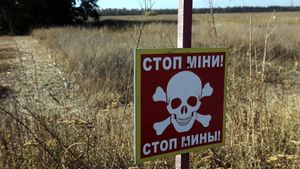Winter often brings with it the promise of snowmen, hot chocolate, and cozy fires. But for many pensioners across the UK, this winter is shaping up to be anything but warm, thanks to controversial cuts to winter fuel payments announced by Prime Minister Keir Starmer's government. The change means millions of elderly individuals will find themselves without the financial support they once relied on to keep their homes heated during the chilly months, and the repercussions are already being felt across society.
The winter fuel payment, originally introduced by Labour back in 1997, provided eligible pensioners with up to £300 to help pay their heating bills. It was seen as a lifeline, particularly for those struggling with the rising costs of living. This year, the government has restricted eligibility to only those claiming pension credit and other benefits. This decision has sent shockwaves through communities where vulnerable populations depend on these funds for warmth and well-being.
Sir Keir Starmer has defended the cuts, arguing they make sense amid what he described as "really difficult" financial circumstances. He maintained during multiple local radio interviews, "We must be careful with public funds, especially when they need to be diverted to the NHS and other key services." But his remarks have sparked outrage from both the public and various political figures who argue the cuts disproportionately affect the most vulnerable citizens.
At a recent council meeting, leaders from the Mid Suffolk District Council expressed vehement opposition to the cuts. Council leader Andy Mellen stated, "The decision to cut winter fuel payments for our elderly population is reckless and could lead to disastrous consequences," highlighting concerns about many elderly citizens living without direct access to mains gas, which inflates their heating costs. He pointed out stark statistics: "About 93.53% of the residents eligible for payments will now be left without support, dwindling the number from 24,776 to just 1,604. That’s not just numbers; those are people who might face tough choices about heating or eating this winter."
Copley, known as one of England's snowiest villages, has already felt the effects. Local resident Ken Cook, who has volunteered with the Met Office for over five decades, shared how temperatures can plunge to extremely low levels. “Even on sunny days, we can see ice everywhere. It’s not the type of place people can live comfortably without sufficient heating,” he noted. Residents like Raymond Dixon lament, "I voted for Labour, trusting they would improve our health service. But it feels as if they’ve taken the money off us instead." A poignant reminder of the realities many face as they confront heating their homes amid plummeting temperatures.
Opposition members have also raised alarms about potential fatalities linked to the cuts. During interviews, listeners and advocates reiterated chilling concerns, with one listener, Maxine, declaring, "Elderly people are literally going to die." This has thrown Starmer on the defensive, with him struggling to address these fears directly during interactions. "How is he going to live with these decisions?" asked Maxine, pushing the prime minister to reconsider these significant cuts.
A grim forecast from the government suggests the cut to winter fuel payments could force 100,000 pensioners below the poverty line by 2026. A conservative estimate predicts 50,000 of these individuals will suffer financial hardship next year. This stark warning highlights the severe social ramifications of the policy shift.
Age UK, the charity advocating for the elderly, echoed these stresses, pointing out the heartbreaking reality faced by many pensioners. Caroline Abrahams, the director at Age UK, commented, "Every penny counts for our older citizens, and with inflation on the rise, this increase to their energy bills and the cuts to payments make this winter particularly dreadful for them."
Meanwhile, overall energy costs have risen significantly as well, with Ofgem announcing the energy price cap will increase to £1,738 on average, reflecting another kick to households already struggling financially. Coupled with these troubling bills, many pensioners are now confronted with choices no one should have to make: choosing warmth over basic needs.
Scottish Labour has pledged to counteract the cuts, promising to restore payments to affected pensioners. Similarly, Northern Irish pensioners will receive temporary assistance via one-off payments from Stormont, aiming to relieve some of the immediate pressures. Yet, questions remain as to whether these measures will be enough to make up for the losses on the mainland.
Critics of the government's policy have proposed alternative solutions, such as returning to the original un-restricted funding system. Observers argue this misstep reflects broader systemic failings within the current administration's approach to socio-economic welfare. Sarah Fritz, a political analyst, commented, "By instituting these cuts, the Labour party risks losing the support of their traditionally loyal base who believe their welfare is being neglected. There’s real anger out there, and people are feeling their voices aren’t being heard."
The ramifications extend beyond just the surface-level savings; they question the very values guiding policy choices today. There remains deep concern among activists and voters alike about how decisions are made, what standards they comply with, and whose interests they truly serve. The cuts have ignited heated discussions about balancing responsible governance against the foundational social safety nets established over decades.
With winter fast approaching and temperature forecasts predicting severe weather, local councils and community leaders bracing for the season's impact are becoming increasingly vocal. They urge the government to reconsider its position and to reinstate full winter fuel payments for all eligible pensioners. The upcoming parliamentary debates are likely to expand on this heated topic, and calls for intervention will continue ringing through district councils and community meetings across the country.
For now, older generations prepare to face challenges exacerbated by these cuts. Conversations among pensioners now often revolve around cutting back on heating to save on costs or seeking local charities for assistance. The dual threats of rising bills and diminishing support create harsh realities, where comfort and safety during winter months are now precariously balanced.
The story of winter fuel payments cuts is not just about government budgets or fiscal policies; it's about vulnerable people standing on the brink, hoping for support. Each decision reverberates through the lives of those who depend on them, provoking questions about priorities and reminding us just how fragile our society's safety nets can be.
While the current government defends the necessity of such cuts, the battle between financial pragmatism and humanitarian duty continues to play out, highlighting pressing needs within our communities. The winter season should be nurturing warmth and joy—not reminders of what’s been taken away from those who need it most. The future remains uncertain as the government charts its course, but the charge against these cuts has sparked hope among those rallying together for change.



